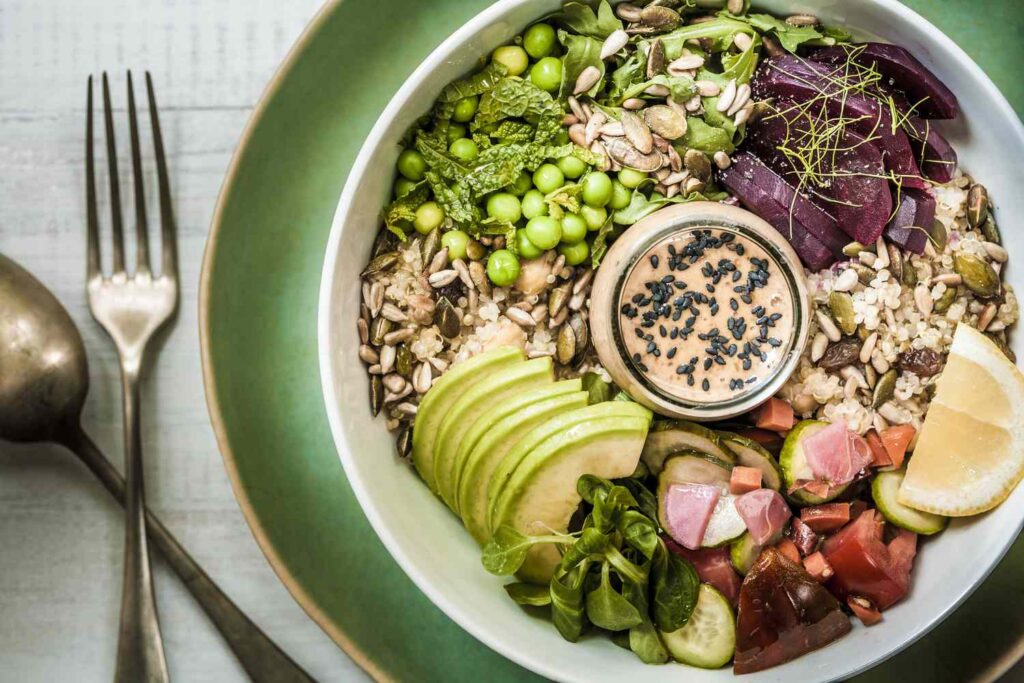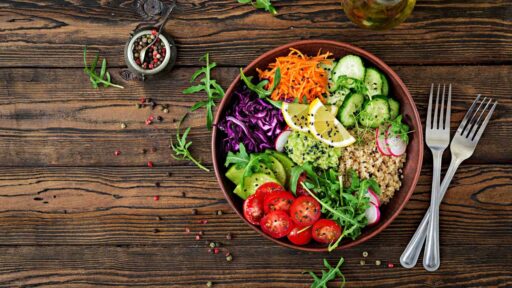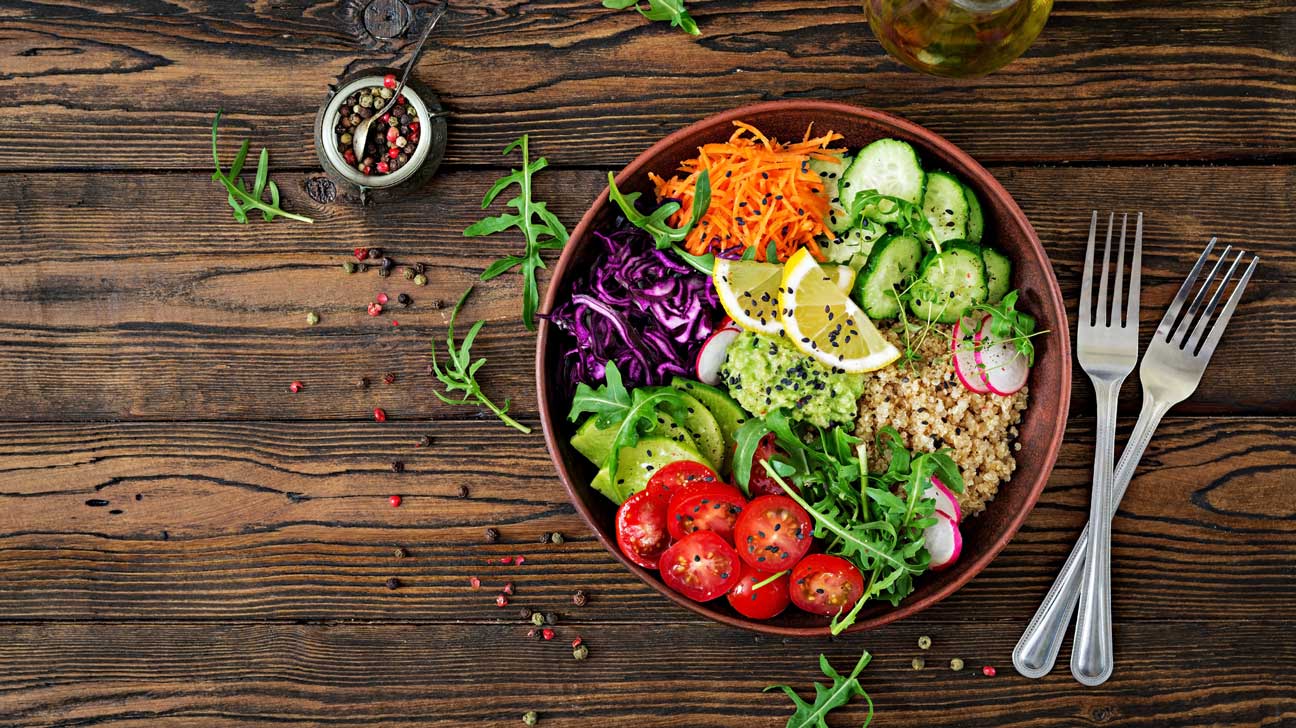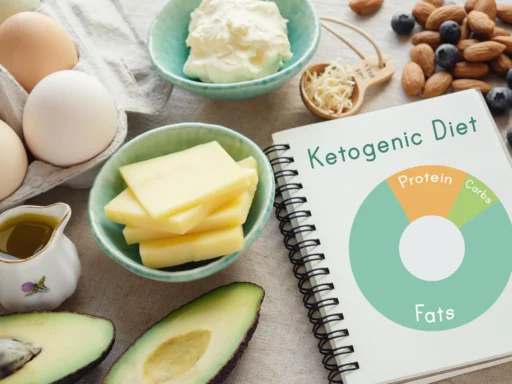Due to its advantages for health and moral reasons, millions of people worldwide have adopted a vegetarian diet. The vegetarian diet offers a varied and wholesome way to eat, regardless of whether one is driven by environmental concerns, animal compassion, or personal health goals. The foundations of vegetarianism, its varieties, and how to maintain a healthy, balanced lifestyle while adhering to it are all covered in this article.

A vegetarian diet: what is it?
A vegetarian diet mostly consists of avoiding meat, poultry, and seafood. It does, however, permit a vast range of plant-based foods, including as grains, legumes, nuts, seeds, fruits, and vegetables. Some vegetarians eliminate all foods originating from animals, while others may include dairy and eggs within their diet. This all depends on personal tastes.
Different Vegetarian Diet Types
The vegetarian diet comes in a variety of forms, each with specific recommendations on the use of animal products (if any):
Vegan-lacto:
include dairy items such as butter, cheese, yogurt, and milk; however, it does not include eggs, meat, poultry, or seafood.
ovo-vegetarian
Contains eggs but stays away from meat, poultry, fish, and dairy goods.
An ovo-lacto vegetarian
includes eggs and dairy products but excludes all meat, poultry, and fish items. One of the most popular kinds of vegetarian diets is this one.
a pescatarian
a vegetarian diet that stays away from other meats like hog, chicken, and beef but incorporates fish and shellfish. Dairy and eggs may also be included by certain pescatarians.
Vegan:
excludes anything that comes from animals, such as dairy, eggs, honey, meat, poultry, shellfish, and even some food additives that come from animals. All of the foods on a vegan diet are plant-based.
Advantages of a Vegetarian Diet for Health
Many health advantages can be obtained with a well-planned vegetarian diet. According to studies, vegetarians may be less likely to develop several chronic illnesses, like:
Heart Conditions:
Diets low in cholesterol and saturated fat, such as vegetarianism, can minimize the risk of heart disease. Rich in fiber, antioxidants, and heart-healthy fats, a lot of plant-based meals promote cardiovascular health.
Controlling Weight:
When compared to meat eaters, vegetarians frequently have a higher chance of maintaining a healthy weight. Diets high in fiber and low in calories are characteristic of plant-based diets, which can aid with overeating prevention and satiety.
Reduced Chance of Specific Cancers:
Vegetarians may be less likely to get some cancers, such as colorectal and breast cancer, according to several research. This is probably because plant-based diets are abundant in fiber, antioxidants, and phytonutrients.
Better Digestive Process:
Plant-based diets’ high fiber content can aid in encouraging regular bowel movements and reducing digestive problems like constipation.
Improved Regulation of Blood Sugar:
Vegetarian diets can lower the incidence of type 2 diabetes and improve blood sugar levels, especially those high in nutritious grains, legumes, and vegetables.
Durability:
According to research, people who eat a plant-based diet may live longer and experience a decreased chance of passing away too soon from diseases linked to their lifestyle.
Important Nutrients to Consider
Although there are many health advantages to eating a vegetarian diet, it’s crucial to make sure that certain nutrients—which are frequently included in animal products—are sufficiently supplied. Vegetarians should be mindful of the following essential nutrients:
Protein
Though many people are familiar with meat as a source of protein, there are also many plant-based choices. Legumes (beans, lentils, peas), tofu, tempeh, quinoa, nuts, seeds, and dairy products (for those who consume them) are good sources of protein for vegetarians.
Iron:
The body absorbs non-heme iron from plants less readily than it does iron from meat. Combine foods high in iron, such as spinach, lentils, and fortified cereals, with foods high in vitamin C, such as citrus fruits, tomatoes, and bell peppers, to increase the body’s absorption of iron.
B12 vitamin:
The main source of this vitamin is animal-based foods. Vegans and other vegetarians should think about taking a B12 supplement or eating foods that have been fortified (such as some plant-based cereals and milks).
Calcium
Dairy products are an excellent source of calcium for lacto-vegetarians. Fortified plant-based milks, tofu, almonds, and leafy greens like bok choy and kale are good sources of calcium for vegans.
The Fatty Acids Omega-3:
Omega-3s may be found in fish, but vegetarians can also receive them via flaxseeds, chia seeds, walnuts, and algae-based supplements.
Zinc
The immune system and wound healing depend on zinc. Whole grains, beans, lentils, and tofu are excellent plant-based sources of zinc.
Some Advice for Beginning a Vegetarian Diet
Here are some pointers to get you started if you’re new to vegetarianism or are thinking about making the switch:
Arrange Well-Balanced Meals:
Make sure that every meal consists of a range of dietary categories, such as whole grains, fruits, vegetables, legumes, and tofu, as well as proteins and healthy fats.
Try Some New Recipes:
Discover vegetarian recipes from across the world, including those from the Middle East, Mediterranean, and Indian cuisines, which frequently feature a large number of plant-based foods.
Transition Gradually:
If the thought of being a vegetarian sounds overwhelming, start with a few meatless meals each week and work your way up to a totally vegetarian diet.
Remain Up to Date:
To make sure you’re getting all the necessary nutrients, keep studying about nutrition. Think about speaking with a dietician if necessary.
Try Different Meat Substitutes:
Tofu, tempeh, seitan, and jackfruit are examples of plant-based meat substitutes that may mimic the texture and flavor of meat, making the switch simpler.

In summary
A healthy and sustainable eating pattern that is good for the environment and the person is the vegetarian diet. Vegetarians may have a healthy, well-balanced diet by emphasizing entire, plant-based meals and paying attention to important nutrients. There are plenty of tasty and fulfilling food alternatives available when you choose a vegetarian diet, regardless of your motivations—health, ethics, or the environment.
Taking up vegetarianism is a great way to improve your health and support the environmental and social reasons that are becoming more and more popular throughout the globe.







